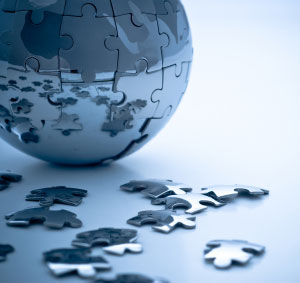How’s That New World Order Working Out?
Foreign Policy |
Looking for a sign of when the multipolar moment suddenly seemed real? You could do worse than mark the day when Brazil and Turkey -- two of the world's most avidly internationalist emerging powers -- joined together this May to announce they had stepped in to broker a nuclear-fuel swap deal with Iran that potentially -- though sadly not actually --paved the way toward a peaceful solution to the standoff. Turkey and Brazil aren't superpowers, nor are they permanent U.N. Security Council members. But just as U.S. President Barack Obama came into office preaching a renewed focus on multilateralism, rising powers are reminding us that respect for hierarchy is no longer on anyone's agenda.
What a difference a couple of decades makes. A little over 20 years ago, then U.S. President George H.W. Bush -- who had just witnessed the fall of the Berlin Wall and saw the Soviet Union disintegrating before his very eyes -- stood at the granite podium of the U.N. General Assembly in New York and proclaimed a "new world order," a U.S.-dominated international system "where the rule of law supplants the rule of the jungle." Two decades later, the "new new world order" we are in fact living looks almost nothing like what Bush -- and most Americans -- imagined or hoped.
The United States still has the world's most powerful military, of course, but its utility is diminishing as the capacity to deter and resist spreads. Just look at Iraq and Afghanistan. Military might and political influence no longer necessarily go together, and too much of the former can even undermine the latter. More fundamentally, the world has quickly become multipolar, with the European Union a larger economic player than the United States while China rises quickly on all measures of hard and soft power.
Obama couldn't give the "New World Order" speech today; he'd have to negotiate it first with his peers in Brussels and Beijing. And as for democracy: Meet authoritarian state capitalism, a new entry into our lexicon thatunderscores the non-Western options every state can pursue today. Nobody's talking about the Washington Consensus anymore -- instead the Beijing Consensus, the Mumbai Consensus, and even something only half-jokingly called the Canuck Consensus are competing for the hearts and minds of global elites.
Rather than a world of alliances, it's a world of multi-alignment.Globalization means never having to choose sides. Look at the Persian Gulf states. They make big-ticket arms deals with Washington, buying weapons to recycle their petrodollars and deter Iran; sign huge trade agreements with China, where ever more of their oil flows; and negotiate currency arrangements with the European Union. If there is any doubt as to the general lack of foresight that governs international relations today, just consider how America has ceased certain joint weapons production with Israel as punishment for Israel's selling sensitive technology to China, which in turn sells missile technologies to Iran, whose leadership wishes to eradicate Israel from the map. Everyone is playing everyone else in what seem like endless single-iteration prisoner's dilemma games.
Bush Sr. chose to give the speech at the United Nations for a reason: America was the preeminent power, but he was a multilateralist. Paralyzed during the Cold War, the United Nations now had a chance toplay the central role as arbiter of global governance for which it was envisioned. But rather than personify multilateralism itself, the United Nations is proving to be at best just one manifestation of it. Free-standing functional agencies like the World Trade Organization and the International Monetary Fund -- which has only become more important in the wake of the financial crisis -- are our only effective global bodies, and they are solely economic in nature. But the G-20 has hardly lived up to its billing as the new "steering committee for the world." Before the most recent Seoul summit, world leaders described U.S. proposals for harmonizing current account surpluses and deficits as "clueless." The Security Council has long ceased to be legitimate or effective, with littleprospect for reform in sight. As we learned so painfully this year, the United Nations can't forge a global climate deal and can't make the world meet the Millennium Development Goals. For every issue there are now several specialized agencies, like the World Food Program and Office of the U.N. High Commissioner for Refugees, that mostly secure their own funding contributions and are evolving at their own pace.
The closest thing we have to multilateral governance happens on a regional level, and it is far more promising, whether the deeply entrenched and supranational European Union, the rejuvenated Association of Southeast Asian Nations, or the nascent African Union. Each is building a regional order tailored to its members' priorities and level of development. On Sudan and Somalia, it's Uganda leading the new diplomatic and peacekeeping push. For Palestine, the Arab League is considering a peacekeeping force. And on Iran, Turkey is now in the lead.
The world of 1990 was expected to remain fundamentally international. Yet instead its very structure has changed as globalization has empowered legions of transnational nonstate actors from corporations to NGOs to religious groups. As a result, today's world features overlapping and competing claims to authority and legitimacy. The Gates Foundation gives away more money each year than any European country. Villagers in Nigeria expect Shell to deliver the goods, not their government. And Oxfam shapes the British development agency's priorities more than the reverse.
Neither the United States nor the United Nations can put the genie back in the bottle. With each passing year, deal-making at Davos and the Clinton Global Initiative become more important than the glacial advance of empty declarations at international summits. These and other venues are the places where the "new new world order" is being built. And it's happening from the bottom up rather than the top down.
